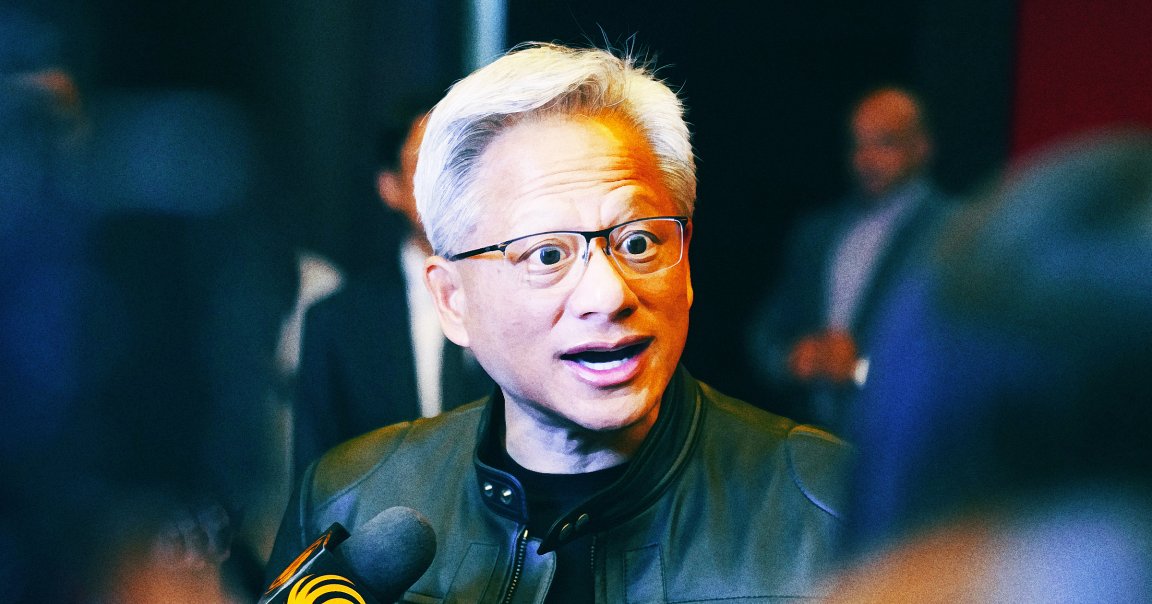
Wall Street was bristling earlier this month as the chipmaker Nvidia behind the AI boom hit a record market value of $3.92 trillion, narrowly eclipsing Apple’s record of $3.915 trillion set last December.
Just days later, Nvidia became the most valuable company in history, breaking the $4 trillion value ceiling and pushing CEO Jensen Huang up to being the world’s sixth richest person, with a net worth of over $143 billion.
With his bag safely secured for the next several dozen generations, Huang celebrated his dynasty with an ominous warning: “everybody’s jobs will be affected.”
Speaking with CNN‘s Fareed Zakaria, Huang repeated the spooky threat, which the broader tech sector has been dining out on for years.
At the center of Huang’s prediction is productivity — the idea that AI will soon produce more market value than human workers, in less time and for a lower cost — though, like many of his peers, he also mixed in the confusing claim that there will still be room for human jobs, which will take as-yet-undisclosed new forms.
“Some jobs will be lost,” Huang said. “Many jobs will be created and what I hope is that the productivity gains that we see in all the industries will lift society.”
What “lifting society” means in practice remains to be seen. For all the billions of dollars poured into AI, our tech overlords have refused to use their fortunes to prepare us for the coming AI job apocalypse they insist is right around the corner. Instead, they’ve aligned with politicians bent on the destruction of the social safety net and the privatization of public services for the direct benefit of the ultra-wealthy.
Case in point, while Nvidia’s stock price soared following Huang’s headline-grabbing interview, the reality for workers is much less green. Were the CEO to ever talk to one of them, he might find that “productivity” is the last thing on anyone’s mind.
In mid-2024, a study of 2,500 workers found that 77 percent reported decreased productivity and even higher workloads when using AI. Just under 40 percent of workers reported increased workloads caused explicitly by AI’s sloppy mistakes, while 47 percent of respondents “didn’t know how to achieve the expected productivity” gains with AI.
More recently, a survey of 25,000 employees across 7,000 workplaces by the National Bureau of Economic Research in Denmark found that enterprise AI contributed to paltry productivity gains overall compared to typical productivity growth over time.
For workers, “AI chatbots have had no significant impact on earnings or recorded hours in any occupation” — meaning that if AI is about to take everyone’s jobs, it’s being awfully quiet about it.
While loads of startup grifters and cynical PR spinsters have spent years pushing the AI automation story, the Nvidia CEO’s forecast marks a noteworthy departure from his previous take on the issue.
Earlier in June, Huang pushed back hard on Anthropic CEO and fellow tech billionaire Dario Amodei’s hairbrained statement that AI could automate half of all entry-level office jobs within five years — a claim so out of line with the tech’s current abilities that it’s almost meaningless.
“One, he believes that AI is so scary that only they [Anthropic] should do it,” Huang said at the time. “Two, [he believes] that AI is so expensive, nobody else should do it… and three, AI is so incredibly powerful that everyone will lose their jobs, which explains why they should be the only company building it.”
It was a harsh repudiation of Amodei’s obnoxious AI fearmongering, and a seemingly sober take from someone in Huang’s position — at least at the time.
Nvidia, it should be noted, currently controls 90 percent of the datacenter chip market, holding an immense position of power over the tech industry, the Fortune 500, and US military interests. Unlike the companies relying on his hardware, Huang’s Nvidia depends less on an AI automation sales pitch, and more on a constant line of chip buyers.
More on AI: CEOs Using AI to Terrorize Their Employees